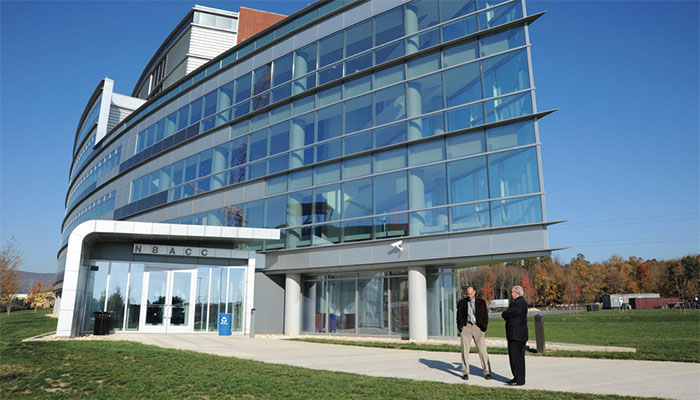WASHINGTON – Lawmakers are fighting to preserve a long-standing research laboratory in Frederick, Maryland, after President Donald Trump’s proposed budget for fiscal year 2018 eliminated the facility’s funding.
The National Biodefense Analysis and Countermeasures Center, located at Fort Detrick in Frederick, is one of seven facilities of its kind in the country. The $143 million center, which opened in 2010, operates under the Department of Homeland Security, employs more than 180 people and often assists the FBI and law enforcement agencies in investigating bioterrorism and biocrime.
Rep. John Delaney, D-Potomac, along with Maryland Democratic Sens. Ben Cardin and Chris Van Hollen successfully added amendments to a defense authorization bill to prevent the center from being immediately shut down.
At the end of May, Trump presented a detailed budget to Congress that included a 28 percent reduction in funding to the Science and Technology Directorate of DHS. The same week, the Frederick research center received a letter from DHS stating that the facility’s closing procedures should start on Oct. 1, with anticipated decommissioning by Sept. 30, 2018.
“I am concerned that this is part of an ill-advised agenda by the Trump Administration to reduce investments in actually effective and important parts of our security portfolio in order to pursue a political agenda,” Delaney said in a statement days after Trump presented his budget. “This looks like they’re cutting everything they can find to pay for a wall along the Mexican border.”
The Frederick biodefense center contains “Biosafety Level 4” labs, which is the highest safety classification. This accreditation is required for work with pathogens for which no vaccine or treatment exists, and it allows the program to test and analyze life-threatening agents such as anthrax and the Ebola virus.
DHS’s Science and Technology budget proposal states that the Fort Detrick facility’s capabilities “can be replicated at other facilities.” The budget document also justified cuts to the lab facilities, saying the funds would go towards some of Trump’s campaign promises.
“The proposed strategic reductions will ensure that S&T is right-sized for the future and allow S&T to focus on the highest priority needs of the Homeland Security Enterprise (HSE), such as border security and immigration technology,” the document states.
The biosafety lab center is managed by Battelle National Biodefense Institute. Spokesman Brian Gaudet said the facility helps fulfill national safety goals.
“NBACC has two primary missions: one is threat characterization, basically looking at all the potential select agents that are out there that can be used against the American populace to harm human life,” Gaudet said. “It’s our job to basically look at the gaps out there, what potential select agents are out there, what do we know about it, and what can we propose to other agencies as countermeasures.”
In addition to the work the Frederick facility does for the nation, it is also actively involved in the Frederick community through donations to the STEM programs in the county’s public schools and helping initiate the Maryland Science Olympiad program, Gaudet added.
“We’ve been in Frederick for a decade,” he said. “We’ve worked hard over that time to really become a part of the business and civic community in Frederick.”
Fort Detrick also houses two other Biosafety Level 4 labs which were not fully defunded by Trump’s budget proposal. These labs operate under the U.S. Army and the National Institute of Allergy and Infectious Diseases.
Delaney’s amendment to the defense authorization measure prohibits any Biosafety Level 4 lab – including the one at Fort Detrick – from being closed or transferred until a more in-depth analysis of the laboratory’s function and contributions is completed.
After Delaney’s amendment was added to the bill, the House passed it and sent it to the Senate for consideration.
“Closing NBACC would be bad for Frederick, but it would be worse for the country: we should not do anything to weaken our biodefense capabilities,” Delaney said.
In the Senate, Cardin and Van Hollen sponsored an additional amendment which added one provision to Delaney’s: a transition period. This amendment established a grace period during which no federal funds “may be used to support the closure, transfer, or other diminishment of the NBACC or its functions.”
This additional amendment allows the Frederick lab to continue operations for at least one year after the defense authorization bill is passed or 180 days after the analysis of the facility’s operations is submitted to Congress, whichever date comes later.
“Preventing this closure will allow for the Department of Homeland Security to work with other agencies that rely on this lab, and ensure that our country does not lose this essential capability,” Cardin said in a statement last week. “This will ensure our continued ability to understand and counter against biological threats to our national security.”
The Senate version of the defense authorization bill passed on Sept. 18.
Gaudet said funding for the Frederick lab is in the House appropriations package, currently awaiting Senate action. For the time being, the program has funding until the end of the program year, March 18, 2018.
“They are all our champions,” Gaudet said of Cardin, Van Hollen and Delaney, “and they’ve done a fantastic job to help keep our lab alive.”

